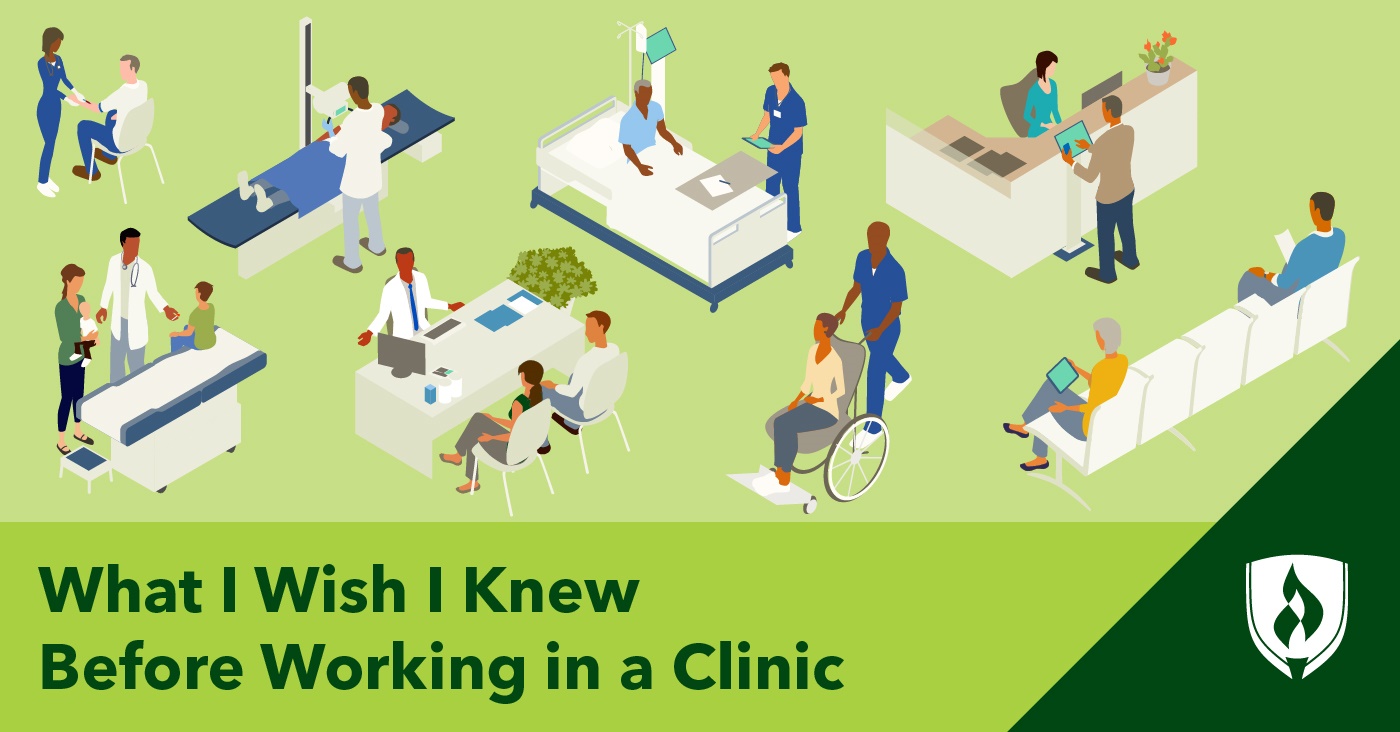What I Wish I Knew Before Working in a Clinic
By Carrie Mesrobian on 03/14/2022

A career in healthcare sounds appealing, and it can be fulfilling to earn a living by helping ailing patients get back on track. Add into the mix that the Bureau of Labor Statistics (BLS) projects healthcare occupations to add about 2.6 million new jobs from 2020 to 2030, and the prospect of working in healthcare might just be the perfect career path for you.1
Of course, there’s still a lot more worth considering after narrowing your potential career down to healthcare. One piece worth considering? The setting you could end up working in. For example, what’s the difference between working in a clinic versus a hospital? Is one option “better” than the other?
While not every healthcare professional is going to have their pick of work setting, it’s still good to know how these settings may differ in general. To help with that, we’ve asked a clinical director with years of experience in both settings to offer up their insight. Read on to learn more about the key differences you should know about before working in a clinic.
Working in a clinic versus working in a hospital: How do they compare?
1. Clinics typically offer a limited range of treatments and services
You’ll usually see fewer patients and types of treatments in a clinic than in a hospital. Because of their size, clinics typically offer a smaller slate of services and treatments than larger healthcare facilities. Unlike a hospital campus, a clinic has limited space for equipment, exam rooms and lab testing.
“Some clinics will have two to three services featuring smaller departments,” says Chaye McIntosh, clinical director at ChoicePoint Health. “Most clinics, however, are a single unit offering specialization in one service, i.e., dermatology, dental care, etc.”
Unlike a hospital, which can offer a broad range of services, clinics cannot treat or even diagnose every possible concern. Clinics may be further limited in who they serve in terms of age and medical issues, such as pediatrics, obstetrics and gynecology.
2. Clinics have fewer employees on staff
Since most clinics aren’t operating 24/7 and typically focus on either narrow specialties or tending to everyday “general practice” health concerns, they don’t have as many employees on staff as you’d find in a hospital. While that’s probably not a huge surprise, it can change the dynamics of a workplace. Instead of potentially blending into a crowd of healthcare professionals who might rarely interact in a hospital, you’ll spend your time working very closely with a small core of people.
“There’s limited staff at the clinic, and they tend to stay longer,” says McIntosh. “I have two employees at my clinic who’ve been working there over five years. We’re like a family.”
The other side of that coin should be considered, though. With a small group, it only takes one or two challenging personalities to turn your daily routine into a daily headache with limited options for keeping your distance from them. You may want to put some extra effort toward maintaining a good relationship with your coworkers in a smaller setting.
3. Clinic jobs may require a broader array of duties for staff
This may not be universal for everyone working in a clinic, but that smaller staff headcount often results in some staffers taking on tasks that maybe wouldn’t fall to them in a hospital setting. For example, a medical assistant in a clinic may have a larger share of administrative tasks like appointment scheduling, data entry, medical scribing and upkeep of the reception desk area.
Small staffs tend to require versatility (within their scope of practice)—so don’t be surprised if you may be occasionally asked to pitch in to help with a few things that a larger hospital may have dedicated staff to tend to.
4. Clinic jobs are more likely to have regular business hours
Because most clinics aren’t involved in critical, around-the-clock care, the hours aren’t as extensive for staff.
“It’s a comfortable work environment,” says McIntosh. “Flexible timing and dependable shifts. Hospital duties are long, non-flexible and strict. This eases a bit on the clinical side.”
Some clinics have extended their hours, staying open later in the afternoon, and many offer Saturday appointments, as well. But generally speaking, you won’t be working night shifts or most holidays at a typical clinic.
5. Clinics may have fewer internal opportunities for advancement
Because of their size and smaller focus, clinics have fewer opportunities for advancement than hospitals, says McIntosh.
“Hospitals have ample departments with more career development for healthcare professionals,” McIntosh explains.
Because clinics don’t have all the resources and staff behind them, you won’t tend to see a wide variety of treatments or cases there.
“If you are someone who’d want lesser work hours with low involvement in risky procedures, go to the clinical side,” McIntosh advises. “However, if you want greater exposure to the medical field, hospitals give you a lot of opportunities.”
That said, this doesn’t mean taking a clinic role is a surefire dead-end move for your career. For one, advancement in many healthcare roles isn’t like climbing a corporate ladder—a “lateral” move into a new setting with additional experience on your resume shouldn’t hurt you. Another factor that can help is that many clinics are owned by large health systems that also operate hospitals and larger specialty facilities, so having your foot in the door with these organizations can help if you’d rather move on.
6. Less income and overtime potential at clinics
“You tend to earn less from a clinic than what you’d get at a hospital,” McIntosh says.
Depending on your situation, this can be a big drawback or an acceptable trade-off. Many healthcare workers in hospital settings have the opportunity to earn overtime pay or shift differential pay to help accommodate for their facilities’ always-on nature.
McIntosh believes the upside of this for clinic workers is that their schedules are typically much more reliable and consistent. Depending on your situation, that may be a worthwhile trade-off—but it might not stay as engaging long-term.
“Your routine is predictable,” McIntosh says of clinic work. “Which might become boring,”
7. Clinics can offer the ability to build relationships with regulars
Working in a clinic often involves seeing the same patients on a regular basis. You’ll learn their children and grandchildren’s names, what their hobbies are, what sports teams they cheer for. McIntosh finds this aspect of clinic work very rewarding.
“The best part is interaction with patients,” McIntosh says. “Since quite often you are directly setting appointments and giving personalized care and advice, this provides a chance to build long-lasting relationships.”
Find your path
Regardless of whether you prefer the fast pace of a big hospital or the steady feel of a clinic, there are plenty of options for you to explore when it comes to working in healthcare—and many of these careers don’t require a Bachelor’s degree to get started! Learn more about some of your potential options for getting started sooner than later with our article “Exploring 12 Healthcare Jobs You Can Launch in Two Years or Less.”
Related Articles:
- Remote Patient Monitoring and Its Impact in the Healthcare Field
- 8 Intriguing Allied Healthcare Careers to Consider
1Bureau of Labor Statistics, U.S. Department of Labor, Occupational Outlook Handbook, [accessed February 2022] www.bls.gov/ooh/healthcare/home.htm. Information represents national, averaged data for the occupations listed and includes workers at all levels of education and experience. This data does not represent starting salaries. Employment conditions in your area may vary.

-(1).png)


